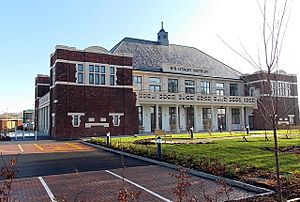John Lysaght and Co. facts for kids
| Industry | Iron and steel |
|---|---|
| Fate | acquired by GKN |
| Founded | 1857 |
| Defunct | 1921 |
|
Number of locations
|
|
|
Key people
|
|
John Lysaght and Co. was an important company that made iron and steel products. It started in Bristol, England, in 1857. Later, it grew to have factories in Wolverhampton, Newport, and Scunthorpe. The company was known for making strong, corrugated iron sheets. A bigger company called GKN bought John Lysaght and Co. in 1920.
Contents
Meet the Founder: John Lysaght
John Lysaght (1832–1895) was born in Mallow, County Cork, Ireland. His family owned land and was quite well-off. John went to school in Bristol, where he made friends with the Clark family.
How the Company Began
In 1856, John Lysaght bought a small business from the Clark family. This business specialized in galvanisation. This is a process where iron is coated with zinc to stop it from rusting. He used a method called the Crawford hot-dip technique.
Growing the Business
John Lysaght renamed the business "John Lysaght Ltd." It started with just six men and one boy. The company bought iron sheets and then galvanized them. These sheets were very popular for building factories. Lysaght chose "Orb" as his special trademark. Orb corrugated galvanised iron sheets became very famous and in high demand.
Expanding Factories and Products
Because the business grew so fast, John Lysaght bought a bigger site in Bristol in 1869. This new factory, called St Vincent's, was much larger. By 1878, it had 400 workers and made 1,000 tons of galvanized iron sheets every month. The company also started making other metal parts for buildings. These were shipped all over the world from Bristol.
In 1878, the company bought two iron works in Wolverhampton. These new factories helped Lysaght's make 40,000 tons of rolled iron sheets each year. Many of these sheets were sent to Australia. John Lysaght even visited Australia in 1879. He started a new company there called Lysaght (Australia). In England, John Lysaght's became a limited company in 1881.
Big Growth and New Locations
John Lysaght's nephews, Sidney Royse Lysaght and William Royse Lysaght, joined the company in the late 1870s. W.R. Lysaght was in charge of making the company bigger. Sidney, however, became a writer of books and poems.
The Orb Ironworks in Newport
Just before John Lysaght passed away in 1895, the company bought land in Newport. They planned to build a brand new factory there. The Orb Ironworks in Newport opened in 1898. By 1901, most of the machines and many workers from Wolverhampton moved to Newport. The factory's football team even became the start of what is now Newport County AFC.
Making Steel in Scunthorpe
Under W.R. Lysaght's leadership, the Newport factory had 3,000 workers, including 600 women. It produced 175,000 tons of metal each year, mostly for export. Daniel Connor Lysaght helped the company start making special electrical steels. In 1912, the company opened its own steelworks in Scunthorpe, Lincolnshire. This meant they no longer had to buy steel from other companies. The Scunthorpe factory made 6,500 tons of steel every week. This steel was then sent to Newport to be rolled into sheets. By 1913, the Newport factory had 42 rolling mills.
Joining Forces with GKN
In 1919, the Lysaght family sold most of their shares in the company. A year later, in 1920, a large company called Guest Keen and Nettlefolds (GKN) bought John Lysaght and Co. This included all its factories in Newport, Bristol, and Scunthorpe.
Global Reach and Lasting Legacy
In 1921, the company started an Australian branch in Newcastle, New South Wales. Many workers from Newport moved there to help set up the new factories. New factories using the Lysaght name were also built or bought in Argentina and Canada. GKN continued to use the John Lysaght name for its Newport and Scunthorpe factories until 1966.
An interesting example of John Lysaght's original work can still be seen today. The metal roof over the platform at Hounslow Central London Underground station was made by the company.
The W.R. Lysaght Institute
In Newport, the Orb steel works employed over 3,500 people at its busiest. To celebrate W.R. Lysaght's 50 years as chairman and thank the workers, the W.R. Lysaght Institute was opened in December 1928. The company and its workers both helped pay for it.
A Community Hub
The Institute was built on 8 acres of land near the factory entrance. It had many facilities for staff, including a ballroom, tennis courts, a bowling green, and beautiful gardens. It was a popular place for workers and their families. The Institute closed in 2001 and became run down. However, it was bought and refurbished, reopening as a community center in November 2012.
Main Factory Locations
- St. Vincent's Iron Works, Bristol
- Swan Garden Works and Osier Bed Works, Wolverhampton
- Orb Iron Works, Newport
- Normanby Park Steel Works, Scunthorpe
See also
- Lysaght, Australia
 | Jessica Watkins |
 | Robert Henry Lawrence Jr. |
 | Mae Jemison |
 | Sian Proctor |
 | Guion Bluford |


